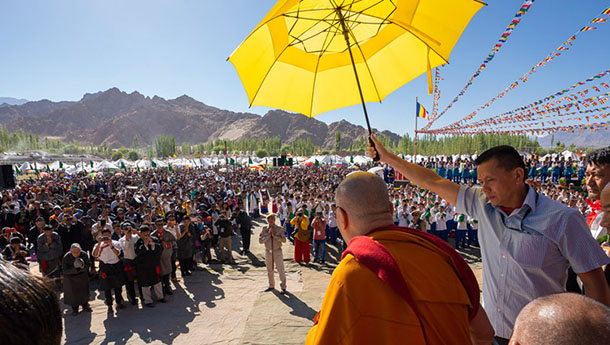Leh, Ladakh, J&K, India — His Holiness the Dalai Lama turns 83, reminded everyone that he is trying to bring peace and happiness for all human beings. On July 6, 2018, a huge crowd had assembled at the Shiwatsel Teaching Ground in Leh, Ladakh, J&K, India to wish the Man of Peace on his birthday.
In the birthday message, the Nobel Peace Laureate says "This world is part of that universe and on this earth are many birds, animals and insects, but there’s not much we can do for them. The beings we can help are the human beings who are physically, mentally and emotionally like us. My goal is to try to bring them peace and happiness."
While greeting an estimated crowd of 25,000 faithful from all over the world, he said: “For this celebration of my birthday we have here Ganden Trisur Rinpoche from whom I have received significant teachings. We also have Drikung Chetsang Rinpoche, other eminent Lamas and scholars and a huge gathering of members of the public."
"When I arrived in Leh the other day the sky was overcast and I wondered if we might have rain today, but instead the sun is blazing hot. I have received many messages of goodwill today and I would like to thank everyone who has sent them.
“When the LBA President announced that they were working to put my advice about study and practice into effect I was really pleased. We pray for the benefit of all sentient beings and when we look into the night sky we can see infinite planets and stars in infinite galaxies where there are infinite such beings.
"This world is part of that universe and on this earth are many birds, animals and insects, but there’s not much we can do for them. The beings we can help are the human beings who are physically, mentally and emotionally like us. My goal is to try to bring them peace and happiness.
“If you are constantly angry you’ll be unhappy and your health will suffer, but if you’re compassionate towards others you’ll be happy and well.
“I’m also concerned to promote harmony amongst our various religious traditions that convey a common message of tolerance, love and compassion. Their different philosophical views are all means of promoting these virtues. Here in Ladakh religious harmony prevails—please keep it up and wherever you can encourage others to work for it too. This is something we can each do in our own way.
“My third commitment is as a Tibetan. The people in Tibet mention my name on their dying breaths, so, clearly, the majority of them put their trust in me. The cause of the Tibetan people is a just and worthy cause. As well as a responsibility towards the people of the Land of Snow, I feel bound to work to preserve the culture and language of Tibet.
“Keeping Tibetan religion and culture alive is something that rests on the shoulders of Tibetans and the people of the Himalayan Region. The great Indian master Vasubandhu advised that the teachings of the Buddha can be classed as scriptural and experiential. To keep them alive we need both to study and develop experience of them. This means reading the scriptures and applying what we learn by exercising the Three Trainings in ethics, concentration and wisdom—in other words, study and practice.
“Lochen Rinpoche has told me of efforts that are being made to put this advice into effect by turning temples and monasteries throughout the Himalayan Region into centres of learning. Time moves on unceasingly. We cannot change the past, but we can shape the future. This is why these schoolchildren here are really a source of hope.
“You Ladakhis tend to say ‘Chag-tsal, I pay homage’ before the collections of scriptures, but without learning to read and study their contents, these words of respect won’t carry much weight.”
Turning to his Muslim friends he said he knew they attributed their religious teachings to Allah, but they too might find benefit from acquainting themselves with the logic and reason of the Nalanda Tradition. “That’s all,” he concluded, “Are you hungry?”


![Tibet has a rich history as a sovereign nation until the 1950s when it was invaded by China. [Photo: File]](/images/stories/Pics-2024/March/Tibet-Nation-1940s.jpg#joomlaImage://local-images/stories/Pics-2024/March/Tibet-Nation-1940s.jpg?width=1489&height=878)
















